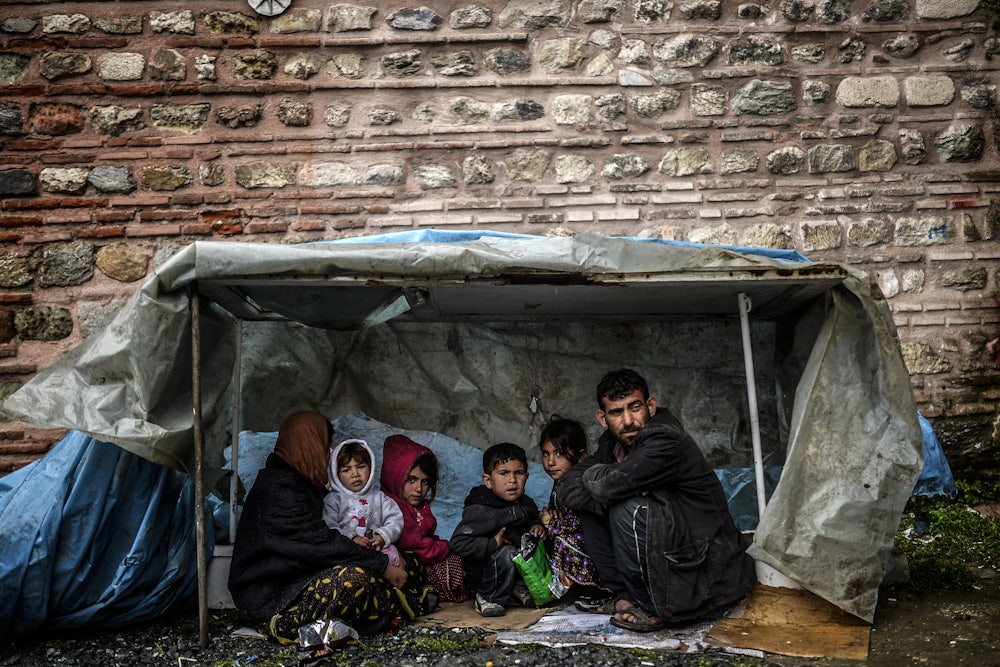The heated anti-immigrant talk from many European and American politicians in the aftermath of the Paris attacks has led those of us who find that response abhorrent to seek out strategies of our own. Things like, for example, reminding that the attackers were European. But the pro-refugee argument that seems to have stuck is the Holocaust analogy, which goes as follows: On the eve of the Holocaust, Americans held unfavorable opinions about Jewish refugees from Nazi Germany and elsewhere in Europe, which, as the punditry goes, is like Republican rhetoric on immigration.
On a certain level I get it. As a Jew, I can’t see news about the current refugee crisis without thinking about the Jews who were turned away from the United States when fleeing Nazi Germany. Not all Jews, of course, have had this reaction, but I’m hardly alone. It’s not a perfect analogy—are they ever?—but the essential point holds: People fleeing oppression should not be conflated with their oppressors, and are actually uniquely helpless once that sort of rhetoric is underway. But as I watched the analogy go viral (see also Ishaan Tharoor’s recent follow-up) in the mainstream press, I began to feel that famous sense of Jewish unease. The current Syrian refugee crisis—and the largely xenophobic response—is really not about Jews. The analogy puts Jews at the center of the symbolic action, which is really the last place we need to be. Anti-Semitism is, at its core, the belief that everything bad on this planet (and perhaps on others as well) happens because of Jewish misdeeds. It’s not so much about straightforwardly hating Jews as it is about wildly overestimating Jews’ influence. As such, anti-Semitism rests on a broader, if not necessarily Jew-hating, conviction, namely that Jews are simply central.
As is quite clear at this point, ISIS and other likeminded extremist groups already use Jews as a symbol of the West. Or, to put this in more urgent, less abstract terms: A Jewish teacher was stabbed in France a few days ago, reportedly by someone in an Islamic State shirt. Swedish Jews are under threat as well. From the extremist view of things, this is totally about Jews—symbolic Jews, yes, but also the real ones who find themselves in the wrong place at the wrong time.
The use of Jews—or, rather, The Jews—to make points that are at most tangentially related to Jews has a long tradition in France, with Jews representing the secular Republic to its friends and foes alike. And as the refugee analogy suggests, Jewish-analogizing is hardly limited to reactionaries, or to xenophobic causes. The progressive left—and by this I mean the Jew-friendly branch of it—analogizes as well. But I always hesitate when I see my favorite thinkers on civil-rights issues not specifically related to Jews (Dan Savage on gay rights, Ta-Nehisi Coates on African American rights) using Jews to make their points, whether in a casual, no-one-would-say-this-about-the-Jews way, or with a more sophisticated historical analogy. And it’s not—let me make this abundantly clear—that Jewish-analogizing is anti-Semitic. It’s not! Often enough, a particular analogy will perfectly well serve some greater—urgent, even—point. The problem is that in the aggregate, this repeated centering of Jews, these repeated rhetorical reminders of Jews, no matter what the subject at hand, have a way of further installing Jews in the position of eternal symbol. And it’s not so great at the symbolic center. Being there means attracting the fury not just of those who straightforwardly hate Jews, but also that of anyone with any opinion on just about any contentious issue. Which is a lot to bear.
While the European-Jews-and-Syrian-refugees analogy itself is sound, there is something that doesn’t sit right about the reasons it keeps getting made outside a Jewish-specific context. Consider the assumption that lies at the heart of the comparison: No one today would think to advocate for turning away Jews, right? To which I feel compelled to ask: Are we so sure? Nodding along to the analogy means, in a sense, agreeing that anti-Semitism is over, and that it’s simply been replaced by anti-Muslim bigotry. Which, no—there’s plenty of bigotry to go around! While it’s true that the political right these days in the U.S., embraces a certain enemy-of-my-enemy philo-Semitism (see especially Mike Huckabee), anti-Semitism has hardly disappeared. It’s not so much Jews as Jewish Holocaust victims who are sacrosanct. The line of progressive argument—whether on Syrian refugees or other topics—that’s about insisting that no one would ever dare say whatever it is about Jews has a way of missing the fact that people actually do dare say all kinds of things about Jews, all the time.
So: Is the point that Syrian refugees would, in a couple generations, become undifferentiated white people, and perhaps create a clever sitcom or two? Or is it that “Nazis are bad” is a truth that most people (not just Jews!) can get behind? Or maybe the analogy is about saying that today’s xenophobes are also Judeophiles, which, while true in some partial, tenuous sense (see, again, Huckabee), ignores that thing, not unheard-of in the West, where white Christian sorts hate all minorities. As for whether the analogy has the potential to change the mind of anyone who wouldn’t have spontaneously come up with this connection… there I have my doubts.
There are very few of us Jews in the world. We neither caused the world’s problems nor hold the answers. So if we’re not central to whichever issue of the day—and typically, we’re not—maybe consider leaving us, as an entity, out of it.
